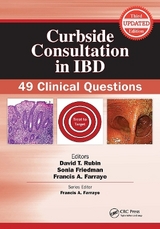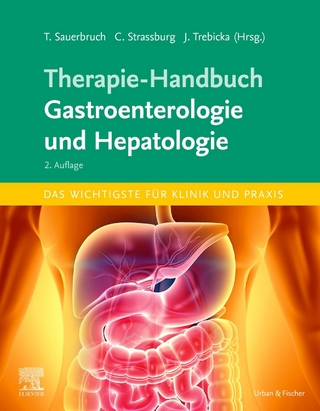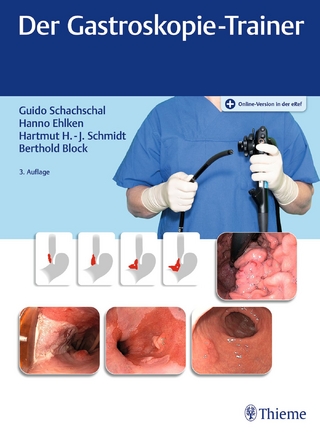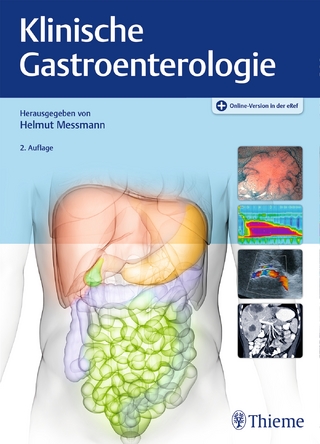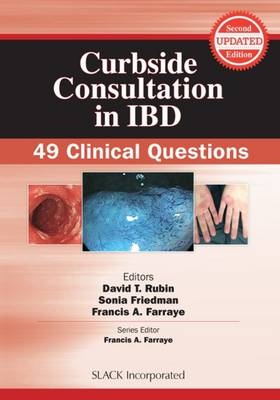
Curbside Consultation in IBD
SLACK Incorporated (Verlag)
978-1-61711-034-4 (ISBN)
- Titel erscheint in neuer Auflage
- Artikel merken
The Second Edition contains new questions and is completely updated!
Are you looking for concise, practical answers to questions that are often left unanswered by traditional inflammatory bowel disease (IBD) references? Are you seeking brief, evidence-based and updated advice for complicated cases or complications? Curbside Consultation in IBD: 49 Clinical Questions, Second Edition provides quick and direct answers to the thorny questions commonly posed during a "curbside consultation" between colleagues.
Dr. David T. Rubin, Dr. Sonia Friedman, and Dr. Francis A. Farraye are joined by a world-class group of contributors on the Second Edition, which offers expert advice, preferences, and opinions on tough clinical questions commonly associated with IBD. The unique Q&A format provides quick access to current information related to IBD with the simplicity of a conversation between two colleagues. Numerous images, diagrams, and references are included to better illustrate IBD.
Some of the questions that are answered inside the Second Edition include:
How can I clarify the diagnosis in my patient with indeterminate colitis?
What is the role of concomitant immunomodulators with biologic use in IBD?
When in the treatment algorithm should methotrexate be considered for Crohn's disease? Is there a role for low-dose methotrexate in the prevention of immunogenicity?
How should we be using fecal markers such as lactoferrin and calprotectin in our patients?
Should I use chromoendoscopy in my surveillance colonoscopy in IBD? How and which agent?
What is the updated approach to antimetabolites and biologic therapy in IBD and pregnancy?
When should I consider anti-integrin therapy for my patient with IBD?
Curbside Consultation in IBD: 49 Clinical Questions, Second Edition has been updated with new questions and answers, and has chapters organized by topic. The format provides information that high-volume clinicians will appreciate, and yet is basic enough for trainees and students.
David T. Rubin, MD graduated with honors from the University of Chicago Pritzker School of Medicine in Chicago, Illinois, and completed his internship, residency, and fellowships in both gastroenterology and clinical medical ethics at the University of Chicago. He is a professor of medicine, the Chief of Section of Gastroenterology, Hepatology and Nutrition, and Co-Director of the Advanced Inf lammatory Bowel Disease Fellowship at the University of Chicago Medicine. Dr. Rubin previously served for 11 years as Director of the Gastroenterology, Hepatology, and Nutrition fellowship program. He also is an associate faculty member at the MacLean Center for Clinical Medical Ethics and an associate investigator at the University of Chicago Comprehensive Cancer Center, both in Chicago. Dr. Rubin is the editor of a best-selling book on inf lammatory bowel disease (IBD), and an author or coauthor of many peer-reviewed articles on IBD, virtual colonoscopy, genetic testing in IBD, and cancer in IBD. He is also a featured media contact for issues related to IBD, appearing on satellite radio, television, and print media. His principal research interests include novel IBD therapies and outcomes, colon cancer prevention, and clinical medical ethics. Dr. Rubin is a fellow of the American Gastroenterological Association, American College of Gastroenterology (ACG), and American College of Physicians and is an active national member of the Crohn's and Colitis Foundation of America. Chosen by his peers as a member of Best Doctors (recognized for superior clinical ability) and America's Top Physicians (gastroenterology), he received the ACG's Governor's Award of Excellence in Clinical Research (2003), the Cancer Research Foundation Young Investigator's Award (2004), and the University of Chicago Postgraduate Teaching Award in recognition of significant contributions for fellowship education (2006). In 2012, Dr. Rubin received the CCFA's Rosenthal Award, a national leadership award bestowed upon a volunteer who has contributed in an indisputable way to the quality of life of patients and families. Sonia Friedman, MD is an associate professor of medicine at Harvard Medical School in Boston, Massachusetts, and an associate physician at Brigham and Women's Hospital, also in Boston. Dr. Friedman completed her undergraduate degree in biology at Stanford University in Palo Alto, California, and her medical degree at Yale University School of Medicine in New Haven, Connecticut. She did her medical internship and residency at the University of Pennsylvania in Philadelphia, Pennsylvania, and her gastroenterology fellowship at Mount Sinai Medical Center in New York, New York. She specialized in IBD during her fellowship and now has a large IBD practice in the gastroenterology division of Brigham and Women's Hospital. She has been at Brigham and Women's for the past 14 years and is Director of Women's Health at the Brigham and Women's Center for Crohn's and Colitis. Dr. Friedman's research interests include colon cancer in Crohn's disease (CD), patient adherence to surveillance colonoscopy, and fertility and pregnancy in IBD. Her clinical interests are the care of patients with CD and ulcerative colitis (UC). She specializes in the management of dysplasia and cancer in IBD, and pregnancy and IBD. Dr. Friedman is a frequent speaker and invited regional and national lecturer on the management of IBD. She has authored or coauthored peer-reviewed papers on cancer in CD, adherence to surveillance colonoscopy in IBD, medical management of IBD, and fertility and pregnancy in IBD. She has written review articles and chapters on various aspects of IBD, including the IBD chapter in Harrison's Principles of Internal Medicine. Her publications include original articles, reviews, or chapters in Gastroenterology, Clinical Gastroenterology and Hepatology, American Journal of Gastroenterology, Inflammatory Bowel Diseases, and Gastroenterology Clinics of North America. She is an associate editor for Inflammatory Bowel Diseases, and is a reviewer for Gastroenterology, Clinical Gastroenterology and Hepatology, and American Journal of Gastroenterology. Dr. Friedman is immediate past chair of the Crohn's and Colitis Foundation New England Chapter Medical Advisory Committee and was their Humanitarian of the Year for 2012. She is a Fellow of the ACG and has served on the CCFA Professional Education Committee. She has been elected as "Best Up-and-Coming Gastroenterologist in Boston" in 2004, and was also listed as "Best of Boston" in Boston Magazine in 2007. Both honors are based upon peer review. Francis A. Farraye, MD, MSc is a professor of medicine at the Boston University School of Medicine in Boston, Massachusetts. He is also Clinical Director in the Section of Gastroenterology and Co-Director of the Center for Digestive Disorders at Boston Medical Center. After graduating from the State University of New York (SUNY) at Stony Brook, Dr. Farraye earned his medical doctorate from Albert Einstein College of Medicine in New York, New York, and his master's degree in Epidemiology from the Harvard School of Public Health in Boston, Massachusetts. He completed an internal medicine residency and gastroenterology fellowship at the Beth Israel Hospital in Boston. Dr. Farraye's clinical interests are in the care of patients with inf lammatory bowel disease and the management of colon polyps and colorectal cancer. He is currently investigating Clostridium difficile infection in IBD patients, the management and diagnosis of dysplasia and cancer in patients with IBD, pouchitis after ileal pouch anal anastomosis, vaccinations in patients with IBD, and the role of serrated polyps as an alternative pathway to the development of colorectal cancer. A frequent speaker and invited lecturer on topics on the diagnosis and management of inf lammatory bowel disease, Dr. Farraye has authored or co-authored over 300 original scientific manuscripts, chapters, reviews, and abstracts. He is the series editor for the text Curbside Consultation in Gastroenterology and co-wrote the text, Curbside Consultation in Inflammatory Bowel Disease and Gastrointestinal Emergencies. His newest books for patients are Questions and Answers about Ulcerative Colitis, Questions and Answers About Crohn's Disease, and Ulcerative Colitis for Dummies. Dr. Farraye is a Fellow of the American College of Physicians, American Society of Gastrointestinal Endoscopy, American Gastroenterological Association, and the American College of Gastroenterology. He has served on numerous committees and currently is a member of the ACG Board of Trustees and the Chapter Medical Advisory Committee for the New England CCFA where he was past chairman. The New England CCFA named Dr. Farraye Humanitarian of the Year in 2003. In 2009, the ACG awarded Dr. Farraye the William Carey Award for service to the college. Dr. Farraye was recognized as "Top Doctor" in Gastroenterology by Boston Magazine and U.S. News and World Report in 2010, 2011, 2012, and 2013.
Dedication
Acknowledgments
About the Editors
Contributing Authors
Preface
Foreword by William J. Tremaine, MD
Introduction
Section I Diagnosis
Question 1 How Can We Assess Prognosis in Crohn's Disease?
Marla C. Dubinsky, MD
Question 2 How Can I Clarify the Diagnosis in My Patient With Indeterminate Colitis?
William J. Tremaine, MD
Question 3 How Do You Evaluate Small Bowel Crohn's Disease? How Do You Assess Response to Therapy?
Talia Zenlea, MD and Adam Cheifetz, MD
Question 4 How Do I Choose Between Computed Tomography and Magnetic Resonance Imaging for My Crohn’s Disease Patients? Is There Still a Role for Barium?
David H. Bruining, MD
Question 5 What Is the Updated Role of Capsule Endoscopy in Crohn’s Disease?
Neal C. Patel, MD; Rafiul S. Islam, MD; and Jonathan A. Leighton, MD
Question 6 What Necessary Testing Should Be Performed Before Initiating Biologic Therapy?
Maria Laura Annunziata, MD, PhD and David T. Rubin, MD
Question 7 How Should We Be Using C-Reactive Protein and Fecal Markers, Such as Lactoferrin or Calprotectin, in Our Patients?
Severine Vermeire, MD, PhD; Marc Ferrante, MD, PhD; and Paul Rutgeerts, MD, PhD
Question 8 My Patient on Tumor Necrosis Factor Alpha Therapy Has a Rash. What Should I Do?
Abrar A. Qureshi, MD and Andrew C. Walls, MD
Question 9 My Crohn's Disease Patient Is Complaining of Joint Pain. What Should I Do?
Richard Keating, MD
Question 10 My Patient With an Ileo Pouch-Anal Anastomosis Has Developed Diarrhea and Urgency. What Is the Differential Diagnosis, and How Should I Evaluate Him? What Is the Significance of Pre-pouch Ileitis?
Simon McLaughlin, MBBS, MD(Res)
Question 11 How Often Does Celiac Disease Coexist With Inflammatory Bowel Disease?
Ciaran Kelly, MD and Toufic Kabbani, MD
Section II Medical Treatment
Question 12 What Endpoints Should We Aim for in Inflammatory Bowel Disease Medical Therapy?
Marc Ferrante, MD, PhD and Gert Van Assche, MD, PhD
Question 13 Is There Ever a Time to Switch to 5-Aminosalicylic Acids in Ulcerative Colitis?
Stephen B. Hanauer, MD
Question 14 Which Therapies Are Steroid Sparing in Crohn's Disease and Ulcerative Colitis? How Should I Manage a Steroid Dependent Patient?
David Kotlyar, MD; Wojciech Blonski, MD, PhD; Joseph Gorodenker, MD; and Gary R. Lichtenstein, MD
Question 15 What Is the Role of Concomitant Immunomodulators With Biologic Use in Inflammatory Bowel Disease?
Russell D. Cohen, MD
Question 16 How Do You Optimize Therapy With Thiopurines?
Antony B. Friedman, MBBS and Miles P. Sparrow, MBBS
Question 17 How Long Do You Wait Before Declaring Treatment Failure With Azathioprine/6-Mercaptopurine, and Do You Ever Consider Stopping Therapy With These Agents After a Period of Time?
Julián Panés, MD, PhD and Elena Ricart, MD, PhD
Question 18 Which Patients Might Be Better for a "Top-Down" Approach (Using Anti-Tumor Necrosis Factor Therapy Before Steroids or Proven Failure of Oral Thiopurines)? Which Patients Should Be Started on Dual Therapy (Immunomodulator and Anti-Tumor Necrosis Factor)?
Sonia Friedman, MD
Question 19 When Is It Appropriate to Switch to Another Biologic Therapy?
David T. Rubin, MD and Adam E. Mikolajczyk, MD
Question 20 What Are the Risks of Biologic Therapies, and How Do You Communicate Them to Patients?
L. Campbell Levy, MD and Corey A. Siegel, MD
Question 21 When Should I Consider Anti-Integrin Therapy for My Patient With Inflammatory Bowel Disease? What Is the Updated Understanding of Progressive Multifocal Leukoencephalopathy and John Cunningham Virus Testing?
Nitsan Maharshak, MD and Scott E. Plevy, MD
Question 22 Is It Ever Appropriate to Stop Anti-Tumor Necrosis Factor in a Stable Patient?
Edouard Louis, MD, PhD
Question 23 When in the Treatment Algorithm Should Methotrexate Be Considered for Treatment of Crohn's Disease? Is There a Role for Low-Dose Methotrexate for Immunogenicity Purposes?
Hilary Steinhart, MD
Question 24 What Are the Relative Benefits of Cyclosporine or Infliximab in Severe Ulcerative Colitis? How Do You Choose Between the Two Options?
Seamus J. Murphy, MD, PhD and Asher Kornbluth, MD
Question 25 How Do You Treat Pouchitis? What Do You Do for Recurrent or Refractory Pouchitis?
Bo Shen, MD
Question 26 What Is the Role of Probiotics in My Patients With Inflammatory Bowel Disease?
Fergus Shanahan, MD
Question 27 What Is Your First-Line Approach to the Diagnosis and Treatment of Patients With Perianal Crohn’s Disease?
Natalie Nesmith, MD and David A. Schwartz, MD
Question 28 How Do You Handle an Inflammatory Bowel Disease Patient With Clostridium difficile Infection?
David G. Binion, MD
Question 29 My Patient Has Primary Sclerosing Cholangitis and Ulcerative Colitis. Is There a Role for Ursodeoxycholic Acid Anymore?
Elizabeth J. Carey, MD and Keith D. Lindor, MD
Question 30 What Is the Optimal Management of Ulcerative Proctosigmoiditis?
Douglas C. Wolf, MD
Question 31 My Patient Has a History of Breast Cancer and Is in Remission From That Condition. She Also Has Crohn’s Disease. Can I Use Azathioprine or Infliximab to Treat Her? What if There Is a Family History of Lymphoma or Leukemia? Should That Influence Management?
Remo Panaccione, MD
Question 32 My Patient Recently Had a Sigmoid Colon Resection for Diverticulitis. The Pathology Report Read "Chronic Colitis." Is Diverticular-Associated Colitis a Subset of Inflammatory Bowel Disease, and Does My Patient Need Any Medical Therapy to Prevent Recurrence of Colitis?
Matthew J. Hamilton, MD and Sonia Friedman, MD
Question 33 What Is the Best Medical Therapy for Inflammatory Bowel Disease in Elderly Patients? Are Anti-Tumor Necrosis Factors Safe in This Patient Population?
Darrell S. Pardi, MD and Edward V. Loftus Jr, MD
Section III Surgical Treatment
Question 34 My Patient With Crohn's Disease Has an Ileal Abscess. What Is the Appropriate Management and Timing of Medical and Surgical Therapies?
Linda A. Feagins, MD and Sunanda V. Kane, MD
Question 35 What Are the Latest Robotic and Laparoscopic Approaches for Inflammatory Bowel Disease Surgery?
I. Emre Gorgun, MD and Feza H. Remzi, MD
Question 36 How Should I Treat My Crohn’s Disease Patient After an Ileocecectomy and Primary Anastomosis?
Miguel Regueiro, MD
Question 37 How Does Perioperative Immune Suppression Affect Surgical Outcomes in Inflammatory Bowel Disease?
Liliana Bordeianou, MD and Richard Hodin, MD
Section IV Cancer/Infection Prevention
Question 38 Should I Use Chromoendoscopy in My Surveillance Colonoscopy in Inflammatory Bowel Disease? How and Which Agent? Would Narrow-band Imaging Be an Alternative for This?
David T. Rubin, MD and Jami A. Kinnucan, MD
Question 39 Can We Follow Flat Low-Grade Dysplasia? Is Any Dysplasia Really Flat or Just a Spectrum of Depth and Size?
Arun Swaminath, MD and Thomas Ullman, MD
Question 40 How Do You Screen and Survey for Dysplasia in Crohn’s Disease Patients? Can You Perform Segmental Resection in Crohn’s Disease Patients With Dysplasia?
Sonia Friedman, MD
Question 41 What Is the Risk of Skin Cancer in Inflammatory Bowel Disease? What Should We Recommend to Our Patients?
Millie D. Long, MD
Question 42 How Do You Approach Polypoid Lesions in Patients With Inflammatory Bowel Disease?
Fernando Velayos, MD and Francis A. Farraye, MD, MSc
Question 43 What Is the Most Effective Strategy to Promote Smoking Cessation in Patients With Crohn’s Disease?
Janani Deffendall, PhD and Andrea King, PhD
Question 44 What Is the Risk of Lymphoma With Antimetabolites and Anti-Tumor Necrosis Factor Agents?
Peter Irving, MD
Question 45 What Is the Updated Approach to Antimetabolites and Biologic Therapy in Inflammatory Bowel Disease and Pregnancy?
Uma Mahadevan, MD
Question 46 Which Vaccines Should I Recommend for My Inflammatory Bowel Disease Patients, and When Should I Give Them?
Sharmeel K. Wasan, MD and Francis A. Farraye, MD, MSc
Question 47 Which Inflammatory Bowel Disease Patients Should I Screen for Osteoporosis? Should I Also Screen for Vitamin D Deficiency?
Hannah L. Miller, MD and Francis A. Farraye, MD, MSc
Question 48 What Is the Role of Diet in the Treatment of Inflammatory Bowel Disease? How Do I Discuss This With My Patients?
Tracie M. Dalessandro, MS, RD, CDN
Question 49 What Advice Should I Give the Inflammatory Bowel Disease Patient Who Is Traveling?
Kim L. Isaacs, MD, PhD
Financial Disclosures
Index
| Sprache | englisch |
|---|---|
| Maße | 178 x 254 mm |
| Gewicht | 658 g |
| Themenwelt | Medizinische Fachgebiete ► Innere Medizin ► Gastroenterologie |
| ISBN-10 | 1-61711-034-5 / 1617110345 |
| ISBN-13 | 978-1-61711-034-4 / 9781617110344 |
| Zustand | Neuware |
| Informationen gemäß Produktsicherheitsverordnung (GPSR) | |
| Haben Sie eine Frage zum Produkt? |
aus dem Bereich
